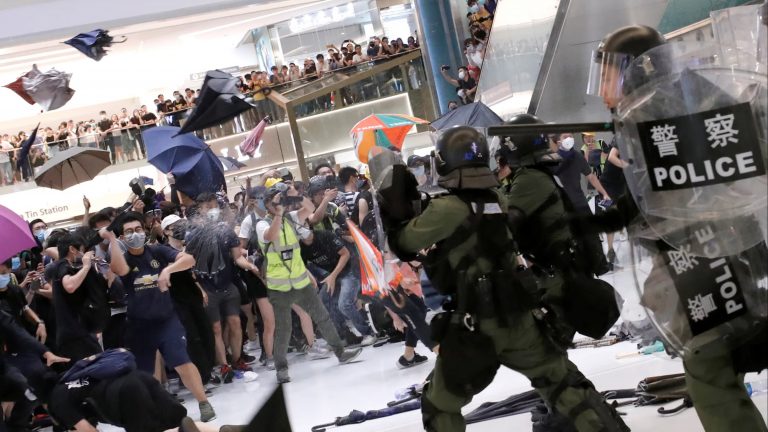
Police fired tear gas at protesters in multiple parts of Hong Kong on Monday after a general strike hit transport and the city’s Beijing-backed leader warned its prosperity was at risk.
The protests surpassed earlier shows of dissent in scale and intensity, seemingly stoked by Hong Kong chief executive Carrie Lam’s refusal once again to meet any of the protesters’ demands, while warning of an “extremely dangerous situation”.
What started several months ago as demonstrations over an extradition bill that would have let people be sent to mainland China for trial have grown into a much broader backlash against the city government and its political masters in Beijing.
The protests are the greatest political threat to the former British colony’s government since it returned to Chinese rule and one of the biggest popular challenges to Chinese leader Xi Jinping since he came to power in 2012.
Amid extensive disruptions to trains and traffic, tens of thousands of demonstrators fanned out across Hong Kong, spreading pockets of activism to most of its main three regions: Hong Kong island, Kowloon and the New Territories.
Police stations were besieged and roads occupied.
In the evening, a group of men armed with sticks tried to attack the black-clad protesters in the North Point district.
Riot police used tear gas in districts including Wong Tai Sin, Tin Shui Wai, Tai Po, and Admiralty close to the city’s government headquarters.
Speaking to the media for the first time in two weeks, Lam remained defiant, rejecting calls to resign, condemning violence and saying the government would be resolute.
She warned that the protests were putting Hong Kong on a path of no return and had hurt its economy.
“They claim they want a revolution and to restore Hong Kong. These actions have far exceeded their original political demands,” said a stern-faced Lam, flanked by some, but not all senior members of her administration.
“These illegal acts that challenge our country’s sovereignty, and jeopardize ‘one country two systems’, will destroy the stability and prosperity of Hong Kong,” Lam said, referring to the territory’s administrative system since 1997, when it was handed back to China.
Demonstrators fear China is gradually encroaching on the island’s cherished autonomy.
China’s Hong Kong and Macao Affairs Office of the State Council said it would hold another news conference on Tuesday at 2.30 pm (0630 GMT), after one last Monday that announced no new major policy shifts by Beijing despite the upheavals.
“I don’t think the government is doing anything to heal society… They provide no solution,” said Jay Leung, 20, a university student who joined a protest, dismissing Lam’s words as a waste of time.
“I didn’t hear anything positive, she just made it worse,” added tourism worker Russell, 38.
Demonstrators blocked key roads, including three tunnels, cutting major arteries linking Hong Kong island and the Kowloon Peninsula. In Yuen Long district, a car rammed through a barricade, knocking down protesters.
Commuters struggled to get to work, with many rail and bus services suspended by activists who blocked trains from leaving stations, some by sitting in doorways.




